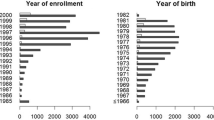Abstract
Any cross-national discussion of education benefits by taking account of the unique factors that shape a particular country’s education system. From the point of view of educational change, these factors often constrain what can and cannot be done; how quickly change occurs; and how likely it is that change, once begun, will endure.
Access this chapter
Tax calculation will be finalised at checkout
Purchases are for personal use only
Preview
Unable to display preview. Download preview PDF.
Similar content being viewed by others
References
AAAS (American Association for the Advancement of Science). (1989). Science for All Americans. Project 2061. AAAS. New York, NY: Oxford University Press.
AAAS. (1993). Benchmarks for science literacy. Project 2016. AAAS. New York, NY: Oxford University Press.
Achieve, Inc. (2013). Next generation science standards: For states, by states. Washington, DC: The National Academies Press.
ASEE CMC (American Society for Engineering Education Corporate Member Council). (2008). K-12 STEM guidelines for all Americans. Retrieved October 15, 2015, from https://www.asee.org/member-resources/councils-and-chapters/corporate-member-council/special-interest-group/cmc-k12-stem-guidelines-for-all-americans-rationale.pdf
Childress, V., & Rhodes, C. (2008). Engineering student outcomes for grades 9–12. The Technology Teacher, 67(7), 5–12.
Childress, V., & Sanders, M. (2007, February 11–13). Core engineering concepts foundational for the study of technology in grades 6–12. Paper presented the National Symposium to Explore Effective Practices for the Professional Development of K-12 Engineering and Technology Education Teachers, Dallas/Ft. Worth, TX.
Cunningham, C., & Knight, M. (2004, June 20–23). Draw an engineer test: Development of a tool to investigate students’ ideas about engineers and engineering. Proceedings of the 2004 American Society for Engineering Education Annual Conference and Exposition, Salt Lake City, UT.
Cunningham, C., C. Lachapelle, & Lindgren-Streicher, A. (2006, June 18–21). Elementary teachers’ understandings of engineering and technology. Proceedings of the 2006 American Society for Engineering Education Annual Conference and Exposition. Chicago, IL. (Washington, DC: ASEE.)
Custer, R.L., Daugherty, J. L., & Meyer, J. P. (2009, July 8–9). Formulating the conceptual base for secondary level engineering education—A review and synthesis. Paper presented at the NAE Workshop on Standards for K-12 Engineering, Washington, DC.
Hacker, M., DeVries, M., & Rossouw, A. (2011). Concepts and contexts in engineering and technology education: An international and interdisciplinary Delphi study. International Journal of Technology and Design Education, 21(4), 409–424.
Harris, E.A. (2015, August 12). 20% of New York State students opted out of standardized tests this year. Retrieved October 12, 2015, from http://www.nytimes.com/2015/08/13/nyregion/new-york-state-students-standardized-tests.html?_r=0
Herschbach, D. R. (2009). Technology education—Foundations and perspectives. Homewood, IL: American Technical Publishers.
Horizon Research. (2013). Report of the national survey of science and mathematics education. Retrieved October 15, 2015, from www.horizon-research.com/2012nssme/wp-content/uploads/2013/02/2012-NSSME-Full-Report1.pdf
Koehler, C., Faraclas, E., Sanchez, S., Latif, S. K., & Kazerounian, K. (2005). Engineering frameworks for a high school setting: Guidelines for technical literacy for high school students. Proceedings of the 2005 American Society for Engineering Education Conference. Retrieved from http://soa.asee.org/paper/conference/paper-view.cfm?id=21254
NAE (National Academy of Engineering). (2008). Changing the conversation: Messages for improving public understanding of engineering. In Committee on public understanding of engineering messages. Washington, DC: National Academies Press.
NAE and NRC (National Academy of Engineering and National Research Council). (2009). Engineering in K-12 education: Understanding the status and improving the prospects. In L. Katehi, G. Pearson, & M. Feder (Eds.), Committee on K-12 engineering education. Washington, DC: National Academies Press.
NAE and NRC. (2014). STEM integration in K-12 education: Status prospects, and an agenda for research (M. Honey, G. Pearson, & H. Schweingruber, Eds.). Washington, DC: National Academies Press.
NAGB (National Assessment Governing Board). (2013). Technology and engineering literacy framework for the 2014 national assessment of educational progress. Retrieved October 16, 2015, from https://www.nagb.org/content/nagb/assets/documents/publications/frameworks/technology/2014-technology-framework.pdf
NCES (National Center for Education Statistics). (2014). Institute of education sciences. Digest of Education Statistics. Table 209.10, Number and percentage distribution of teachers in public and private elementary and secondary schools, by selected teacher characteristics: Selected years, 1987–88 through 2011–12. Retrieved October 16, 2015, from http://nces.ed.gov/programs/digest/d14/tables/dt14_209.10.asp
New America. (2015, June 19). Federal, state, and local K-12 school finance overview (Updated). Retrieved January 22, 2016, from http://atlas.newamerica.org/school-finance
NRC (National Research Council). (1999). Final letter report of the international technology education association standards review committee. Washington, DC: National Academies Press.
NRC. (1996). National science education standards. Washington, DC: National Academy Press.
NRC. (2012). A framework for K-12 science education: Practices, cross-cutting concepts, and core ideas. Committee on Conceptual Framework for New K-12 Science Education Standards. Retrieved January 22, 2016, from http://www.nap.edu/catalog/13165/a-framework-for-k-12-science-education-practices-crosscutting-concepts
Purzer, S., Strobel, J., & Cardella, M. E. (2014). Engineering in pre-college settings: Synthesizing research, policy, and practices. West Lafayette, IN: Purdue University Press.
Sneider, C. (2006, November 12). Draft learning progressions for engineering design. Boston Museum of Science. (Unpublished).
USDOE (US Department of Education). (1983, April). A nation at risk: The imperative for educational reform. Retrieved January 22, 2016, from http://www2.ed.gov/pubs/NatAtRisk/index.html
Author information
Authors and Affiliations
Editor information
Editors and Affiliations
Rights and permissions
Copyright information
© 2016 Sense Publishers
About this chapter
Cite this chapter
Pearson, G. (2016). Characteristics of Pre-College Engineering Education in the United States. In: Vries, M.J.d., Gumaelius, L., Skogh, IB. (eds) Pre-university Engineering Education. International Technology Education Studies, vol 1. SensePublishers, Rotterdam. https://doi.org/10.1007/978-94-6300-621-7_5
Download citation
DOI: https://doi.org/10.1007/978-94-6300-621-7_5
Publisher Name: SensePublishers, Rotterdam
Online ISBN: 978-94-6300-621-7
eBook Packages: EducationEducation (R0)




